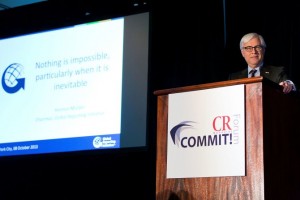 Last week I had the opportunity to participate in the Corporate Responsibility Officers Association annual forum in New York. It was nice to see old friends and meet new colleagues. The two day convening was titled “Good Business Makes the Difference.” My biggest take-a-way is the increasing importance of materiality to our work. Materiality has primarily been an accounting concept where all important matters are to be disclosed, meaning if it is of sufficient importance or relevance as to have possible significant influence on an outcome, report it. Increasingly social and environmental performance is influencing financial performance, but is often not measured. Not enough attention is currently being paid to social and environmental performance by both corporate boards and investors. But they should as it is increasingly having an impact on the bottom line, or will be in the near future. Right now, most social and environmental performance metrics, when reported, are done so voluntarily and are not mandated. There are efforts afoot to make them mandatory.
Last week I had the opportunity to participate in the Corporate Responsibility Officers Association annual forum in New York. It was nice to see old friends and meet new colleagues. The two day convening was titled “Good Business Makes the Difference.” My biggest take-a-way is the increasing importance of materiality to our work. Materiality has primarily been an accounting concept where all important matters are to be disclosed, meaning if it is of sufficient importance or relevance as to have possible significant influence on an outcome, report it. Increasingly social and environmental performance is influencing financial performance, but is often not measured. Not enough attention is currently being paid to social and environmental performance by both corporate boards and investors. But they should as it is increasingly having an impact on the bottom line, or will be in the near future. Right now, most social and environmental performance metrics, when reported, are done so voluntarily and are not mandated. There are efforts afoot to make them mandatory.
As reporting is central to materiality, a workshop was presented titled “GR4 vs. SASB: Should you put all your eggs in one basket.” In my April blog: Global Reporting Initiative: North-American G4 Campaign Kick-off, I discuss the new version of the GRI. “The Sustainability Accounting Standards Board™ (SASB™) is a 501(c)3 non-profit that provides standards for use by publicly-listed corporations in the U.S. in disclosing material sustainability issues for the benefit of investors and the public. SASB standards are designed for disclosure in mandatory filings to the Securities and Exchange Commission (SEC), such as the Form 10-K and 20-F. SASB standards will result in the improved performance of 13,000+ corporations, representing over $16 trillion in funds, on the highest-priority environmental, social and governance issues.”
SASB is focused on an industry; GRI is focused on a company. SASB reporting aspects: Environmental Capital, Social Capital, Human Capital, Business Model & Innovation, Leadership & Governance. GRI focuses on aspirations: Environmental, Human Rights, Labor Practices, Society, Product Responsibility, and Economic. Some say the two will be complimentary, some say competitive. Time will tell, but one thing is for sure, most companies are suffering from reporting fatigue.
Herman Mulder, Chair of the Global Reporting Initiative, said that “what is now voluntary will probably be regulated. “In Europe in particular, we are moving in that direction. Progression of sustainability is being held back by fear of liability. “Reporting is not done for the process; it’s a reflection of the effectiveness of your strategy.” He gave a sobering talk titled: “Another Crisis is Looming Around the Corner.”
Ending the first day was an interesting presentation by Georg Kell, Executive Director of the UN Global Compact. The United Nations Global Compact is planning for the transition from the Millennium Development Goals to a post 2015 architecture. Kell said that “long term successes of businesses are deeply connected to the markets where you operate. “Looking at the business sustainability aspects of what will eventually replace the MDGs will involve shared value. “Short term versus long term is a challenge with companies but the issues and potential for rewards need a long term strategy.” 8,000 companies from 140 countries have joined the Global Compact. The goal us to get to 20,000 to really begin to see change in key markets. There are 10 principles of the Compact covering four areas: Human Rights, Labor, Environment and Anti-Corruption.
The presenters from BrownFlynn did a nice job illustrating the progression of corporate responsibility approach over the decades:
Contributions: Philanthropy → Time & Treasure → Creating Shared Value.
Financial Focus: Compliance → Environment, Health & Safety→ People, Planet, Profit
Communications: PR → Transparency → Collaboration and Innovation
Reporting: Financial Reporting → Sustainability Reporting → Integrated Reporting
CR Program Focus: At Company Direction → Quality over Quantity → Materiality
The 2013 Responsible CEO of the Year awards were presented to Marilyn Hewson of Lockheed Martin, Denise Morrison of Cambell Soup Company, James Murren of MGM Resorts International, Patrick Prevost of Cabot Corporation and John Veihmeyer of KPMG LLP. Lifetime Achievement in Philanthropy was presented to Dan Hesse, CEO of Sprint and my longtime friend and colleague, Charlie Moore, retired executive director of CECP, Committee Encouraging Corporate Philanthropy. In her remarks, Denise Morrison said that we are “committed to making a profit and making a difference.” This was certainly the spirit of the conversations at the Forum.
http://croassociation.org/ www.sasb.org www.globalreporting.org www.unglobalcompact.org
